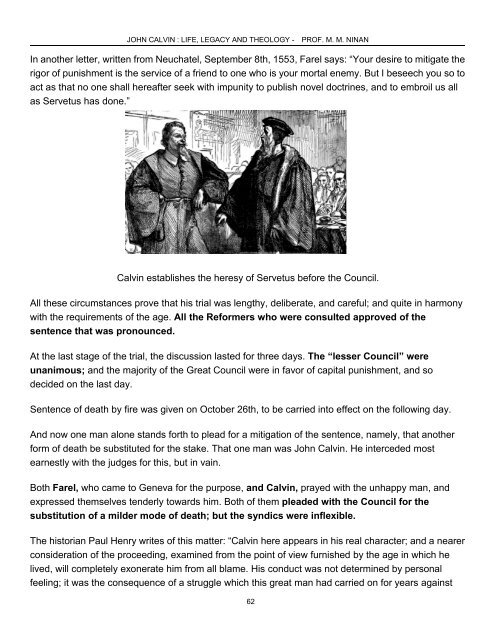Create successful ePaper yourself
Turn your PDF publications into a flip-book with our unique Google optimized e-Paper software.
JOHN CALVIN : LIFE, LEGACY AND THEOLOGY -<br />
PROF. M. M. NINAN<br />
In another letter, written from Neuchatel, September 8th, 1553, Farel says: “Your desire to mitigate the<br />
rigor of punishment is the service of a friend to one who is your mortal enemy. But I beseech you so to<br />
act as that no one shall hereafter seek with impunity to publish novel doctrines, <strong>and</strong> to embroil us all<br />
as Servetus has done.”<br />
<strong>Calvin</strong> establishes the heresy of Servetus before the Council.<br />
All these circumstances prove that his trial was lengthy, deliberate, <strong>and</strong> careful; <strong>and</strong> quite in harmony<br />
with the requirements of the age. All the Reformers who were consulted approved of the<br />
sentence that was pronounced.<br />
At the last stage of the trial, the discussion lasted for three days. The “lesser Council” were<br />
unanimous; <strong>and</strong> the majority of the Great Council were in favor of capital punishment, <strong>and</strong> so<br />
decided on the last day.<br />
Sentence of death by fire was given on October 26th, to be carried into effect on the following day.<br />
And now one man alone st<strong>and</strong>s forth to plead for a mitigation of the sentence, namely, that another<br />
form of death be substituted for the stake. That one man was <strong>John</strong> <strong>Calvin</strong>. He interceded most<br />
earnestly with the judges for this, but in vain.<br />
Both Farel, who came to Geneva for the purpose, <strong>and</strong> <strong>Calvin</strong>, prayed with the unhappy man, <strong>and</strong><br />
expressed themselves tenderly towards him. Both of them pleaded with the Council for the<br />
substitution of a milder mode of death; but the syndics were inflexible.<br />
The historian Paul Henry writes of this matter: “<strong>Calvin</strong> here appears in his real character; <strong>and</strong> a nearer<br />
consideration of the proceeding, examined from the point of view furnished by the age in which he<br />
lived, will completely exonerate him from all blame. His conduct was not determined by personal<br />
feeling; it was the consequence of a struggle which this great man had carried on for years against<br />
62

















